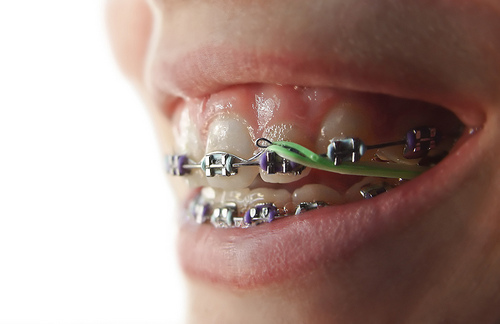June 25th, 2025

Braces can straighten your teeth to give you a more attractive smile for life. The process can take 18 months to two years or more, and this amount of time can seem unending when you first get your braces. Counting down your brace time can help the time pass more quickly and build the excitement for when you finally get your braces removed.
Make a Wall Calendar
Crossing out each day on a calendar is a standard way of counting down time. You can make this more personal by designing your own calendar to help you count down. Use an online customization service to upload photos or designs for each month. Each month’s picture can also display the number of months remaining until you expect your braces to come off.
Schedule Rewards
When you receive regular rewards for continuing to wear your braces, they can seem less burdensome. Plan to buy yourself a reward every month that you wear your braces for the duration of the treatment. The time will pass much faster when you feel you are earning rewards for your patience.
Lengthen a Paper Chain
Use strips of paper to make the links of your chain, and add a new link each week to lengthen the chain. Before sealing each new strip of paper into a circle, write on it a reason why you are getting your teeth straightened, or an event in the future when you will appreciate your straight teeth as you smile.
Use a Wall Hanging
Purchase a large pad of blank white paper. Write a “0” on the bottom sheet and a “1” on the next, and continue until you reach the number of days remaining in your treatment. Rip off the top sheet each day to see how many days are left and remind yourself of the progress you are making.
Find a Buddy
If any of your friends get braces around the same time as you, share the experience. Make a pact to celebrate each trip to Johnson Orthodontics when one of you receives news about your progress.
June 18th, 2025

While mouthwash goes a long way in improving your oral care, it is not a substitute for flossing. Mouthwashes and flossing provide different benefits that you should understand.
Mouthwash Benefits
Mouthwash comes in two categories. Some are considered cosmetic. This type of rinse provides temporary relief from bad breath and has a pleasant taste. These do not actually kill any bacteria.
Therapeutic mouthwashes provide the healthier benefits. These may contain different ingredients including fluoride or antimicrobial agents. This type is used to remove plaque buildup and reduce the potential for calculus formation. Therapeutic rinses can also help prevent cavities, bad breath, and gingivitis. In addition, Dr. Dennis Johnson can prescribe special rinses to assist patients after periodontal surgery or other procedures.
Flossing Benefits
Flossing is what removes the plaque formation before it can harden and become calculus. While a rinse reduces buildup, only flossing will fully remove plaque, especially between teeth. The bristles on a toothbrush do not get between teeth completely. If plaque is not removed, it hardens into tartar or calculus. When this builds below the gum line, gum disease can start.
Types of Floss
Floss is available in a thin string form or a tape. It can be waxed or unwaxed. If you find flossing difficult, you might want to try a different type of floss. You can buy bulk floss in containers or purchase the disposable type with a plastic handle attached. This style can be easier for many individuals to use. Interdental picks are available for bridgework or other situations where regular floss cannot be used.
If you have questions regarding the best mouthwash or floss, or need tips for easier flossing, please ask our Columbus, OH team for advice. We will be glad to give you solutions to help keep your mouth clean and healthy.
June 11th, 2025

Most of our patients at Johnson Orthodontics will need to wear rubber bands at some point during their orthodontic treatment. The main reason our patients are instructed to wear rubber bands is to correct their bite. If your teeth do not fit together properly, Dr. Dennis Johnson will recommend that rubber bands be used. Dr. Dennis Johnson may also recommend using rubber bands to close or open spaces.
Rubber bands are a critical part of your treatment, and wearing them as Dr. Dennis Johnson and our team recommend will help move your teeth into the desired position. Dr. Dennis Johnson may ask you to wear your rubber bands full time, meaning that they should only be taken out when you brush and floss your teeth three times a day. Other times, you may be asked to only wear them part-time, like only during the day or only during sleep.
If you still have any questions about orthodontic rubber bands, we invite you to give us a call or ask us during your next adjustment appointment. Remember, wearing rubber bands as prescribed by Dr. Dennis Johnson is an important step during your treatment, and can reduce the time you have your braces. If you lose your rubber bands or run out, stop by our Columbus, OH office and pick up more!
June 4th, 2025

School’s out. The barbecue’s fired up. T-shirts and shorts are back in style. Sandy beaches and sidewalks are sizzling. Summer’s officially here, and it’s time to get back into hot weather mode. This means getting back into some healthy summer habits.
Be Ready to Hydrate!
Warm weather can lead to dehydration before you know it. And water does more than hydrate—it rinses away food particles after eating or snacking, neutralizes enamel-eroding acids in the mouth, and helps us keep up healthy levels of saliva.
- A reusable water bottle is a summer shopping list must. When you’re out walking, hiking, exercising, or camping, you can’t always be sure you’ll have fresh water available. Fill your water bottle before you leave home—you’ll help yourself stay hydrated, save money, and protect the environment, too!
- When you’re on the go, rinse with water after snacking to help remove food particles from teeth and braces.
- Go light on the sports drinks and sodas when planning your summer menus. They’re often filled with sugars and acids—two very unhealthy ingredients for your teeth.
Restock Your Sunscreen
Sunscreen helps protect skin of all shades and all ages. Exposure to ultraviolet rays is known to cause skin cancer and premature aging. Lip tissue is thin and delicate, especially at risk from the sun’s damaging UV rays.
- Check your sunscreen for its expiration date. Protective sunscreens and lip balms lose effectiveness once that date has passed.
- Some sunscreens are designed for use on lips. If yours isn’t, look for a protective lip balm. All of your sunscreens and balms should have an SPF (Sun Protection Factor) of 30 or higher.
- Bring your sunscreen and balm with you when you’re out and about, and reapply every two hours, or sooner if you’re eating, drinking, or getting wet.
Prep for Summer Adventures
If you’re travelling this summer, make sure the right dental and orthodontic supplies are part of your gear. A travel size toothbrush and toothpaste, a well-ventilated toothbrush case, and your orthodontist’s and dentist’s emergency contact information are basic necessities. If you wear braces, add dental wax and extra rubber bands. If you have aligners or a retainer, don’t forget your case.
Once you have the basics, you can tailor your kit to your summer plans:
- Flying? Make sure every liquid, gel, or aerosol you’ll need is the proper size for carry-on flight rules, 3.4 oz (100 ml) or less. Toothpaste and mouthwash are included in these categories, so look for travel sizes in your favorites.
- Going overseas? Don’t forget plug adaptors or voltage converters if needed for your electric toothbrush.
- Camping? An emergency kit with cotton rolls, over-the counter pain relief, oral pain relief gel, dental wax (for damaged braces or a broken tooth), and even temporary fillings and a tooth preservation kit can be crucial in case of unexpected dental injuries.
Make Sure Dental Care Is on Your Summer Calendar
Laid-back summer days are the best, but laid-back dental care really isn’t! Follow your healthy dental routine even during the lazy days of summer.
- Keep up with your brushing and flossing. Brush two minutes twice each day with a fluoride toothpaste, and floss at least once a day—or more often as your orthodontist recommends.
- If you’re planning a trip, don’t ignore warning signs. If you have tooth pain or sensitivity, see your dentist to treat any problems before you’re cruising at 30,000 feet or enjoying a remote campout miles from anywhere.
- See your orthodontist as scheduled, and make sure to let the office know if you have travel plans which might disrupt your regular treatment schedule.
- Keep your appointments for dental exams and cleanings to ensure year-round dental health.
Whether you’re basking in the warm outdoor weather, relaxing in the shade with a cool drink and a good book, on the road to adventure, or wherever your summer plans take you, we hope these easy tips will help you create a summer filled with bright, healthy smiles.





 Website Powered by Sesame 24-7™
Website Powered by Sesame 24-7™